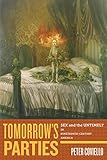Tomorrow's Parties : Sex and the Untimely in Nineteenth-Century America / Peter Coviello.
Material type: TextSeries: America and the Long 19th Century ; 1Publisher: New York, NY : New York University Press, [2013]Copyright date: ©2013Description: 1 online resourceContent type:
TextSeries: America and the Long 19th Century ; 1Publisher: New York, NY : New York University Press, [2013]Copyright date: ©2013Description: 1 online resourceContent type: - 9780814717400
- 9780814717424
- 810.93538 23
- PS217.I52 C69 2016
- online - DeGruyter
| Item type | Current library | Call number | URL | Status | Notes | Barcode | |
|---|---|---|---|---|---|---|---|
 eBook
eBook
|
Biblioteca "Angelicum" Pont. Univ. S.Tommaso d'Aquino Nuvola online | online - DeGruyter (Browse shelf(Opens below)) | Online access | Not for loan (Accesso limitato) | Accesso per gli utenti autorizzati / Access for authorized users | (dgr)9780814717424 |
Frontmatter -- Contents -- Acknowledgments -- Introduction -- PART ONE Lost Futures -- 1 Disappointment, or, Thoreau in Love -- 2 Whitman at War -- Coda -- PART TWO To Speak of the Woe That Is in Marriage -- 3 Islanded -- 4 What Does the Polygamist Want? -- Coda -- PART THREE Speech and Silence: Reckonings of the Queer Future -- 5 The Tenderness of Beasts -- 6 Made for Love -- Coda -- Notes -- Index -- About the Author
restricted access online access with authorization star
http://purl.org/coar/access_right/c_16ec
Honorable Mention for the 2014 MLA Alan Bray Memorial Award Finalist for the 2013 LAMBDA LGBT Studies Book AwardIn nineteenth-century America-before the scandalous trial of Oscar Wilde, before the public emergence of categories like homo- and heterosexuality-what were the parameters of sex? Did people characterize their sexuality as a set of bodily practices, a form of identification, or a mode of relation? Was it even something an individual could be said to possess? What could be counted as sexuality?Tomorrow’s Parties: Sex and the Untimely in Nineteenth-Century America provides a rich new conceptual language to describe the movements of sex in the period before it solidified into the sexuality we know, or think we know. Taking up authors whose places in the American history of sexuality range from the canonical to the improbable-from Whitman, Melville, Thoreau, and James to Dickinson, Sarah Orne Jewett, Harriet Jacobs, Frederick Douglass, and Mormon founder Joseph Smith-Peter Coviello delineates the varied forms sex could take in the lead-up to its captivation by the codings of “modern” sexuality. While telling the story of nineteenth-century American sexuality, he considers what might have been lostin the ascension of these new taxonomies of sex: all the extravagant, untimely ways of imagining the domain of sex that, under the modern regime of sexuality, have sunken into muteness or illegibility. Taking queer theorizations of temporality in challenging new directions, Tomorrow’s Parties assembles an archive of broken-off, uncreated futures-futures that would not come to be. Through them, Coviello fundamentally reorients our readings of erotic being and erotic possibility in the literature of nineteenth-century America.
Mode of access: Internet via World Wide Web.
In English.
Description based on online resource; title from PDF title page (publisher's Web site, viewed 06. Mrz 2024)


